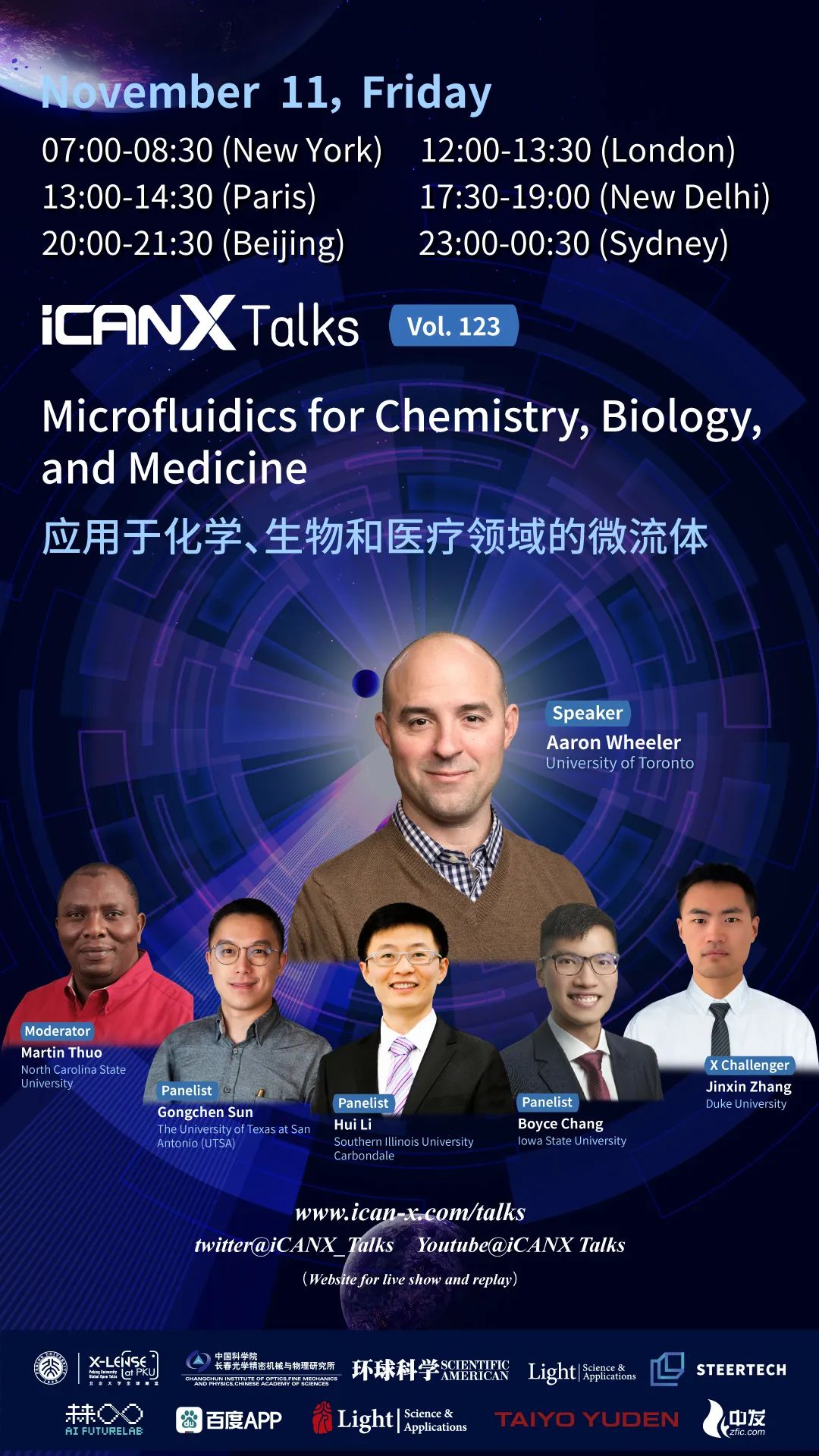Speaker: Aaron R. Wheeler, University of Toronto
Time: 20:00 pm, November 11 (Friday), 2022, GMT+8
Venue: iCANX platform https://www.ican-x.com/talks
Long press to identify the QR code and jump to the webpage!
Abstract:
Microfluidics is the study and application of fluid flow in devices bearing length dimensions in the micrometer range (10-6 m, about the size of a human hair). This technology is revolutionizing the way we live, work, and interact, and in this presentation, I will describe microfluidic tools that my research group has developed to address problems in chemistry, biology, and medicine. For chemistry, I will discuss our on-going work to initiate and evaluate chemical reactions within the tiny bores of super-conducting magnets in nuclear magnetic resonance spectrometers. For biology, I will review our methods for isolating single cells to be able to profile their genomes, transcriptomes, and proteomes. For medicine, I will summarize our work developing point of care diagnostic devices that can be operated in remote settings for serological surveillance of immune status. I will conclude with predictions about what the future may hold for this promising technology.
Biography:
Professor Wheeler earned his B.Sc. in Chemistry at Furman University and Ph.D. in Chemistry at Stanford University, followed by an NIH postdoctoral fellowship at UCLA. In 2005, he joined the Department of Chemistry at the University of Toronto, where he serves as the Tier 1 Canada Research Chair of Microfluidic Bioanalysis, with cross-appointments in the Institute of Biomedical Engineering and the Donnelley Centre for Cellular and Biomolecular Research. Prof. Wheeler is the Editor-in-Chief of the flagship journal in the microfluidics community, Lab on a Chip. He has received numerous awards including the Royal Society of Chemistry Horizon Prize in Analytical Chemistry (2021), the SCIEX Microscale Separations Innovations Medal (2019), the Lab on a Chip Pioneer of Miniaturization Award (2017), an NSERC E.W.R. Steacie Fellowship (2015), a Connaught Foundation McLean Fellowship (2014), the Canadian Society for Chemistry’s W.A.E. McBryde Medal (2013), the Merck GmbH H.E.M. Prize (2012), the Royal Society of Chemistry’s Joseph Black Award (2012), the American Chemical Society’s Arthur F. Findeis Award (2012), an Alfred P. Sloan Fellowship (2009), the Eli Lilly and Company Young Investigator Award in Analytical Chemistry (2008), and the Canadian Society for Chemistry's Fred Beamish Award (2007). He is also an enthusiastic and affable communicator (a trait that is particularly relevant for the iCANX program), which can be seen in wide-ranging interviews in Nature’s skepticalchymist blog, Chemistry World, The Scientist, Bioanalysis Zone, and many others. Thousands of readers and viewers access the group’s twitter and youtube accounts – see, for example, this whimsical 2-minute video clip (https:// youtu.be/IdYNTL64lfw) introducing the group’s approach to developing point-of-care diagnostic devices, or this 1-minute clip about digital microfluidics (https://youtu.be/NAVrYQqpwMQ) that was awarded first-prize in NSERC’s inaugural Science, Action! competition.
Source: iCANX

